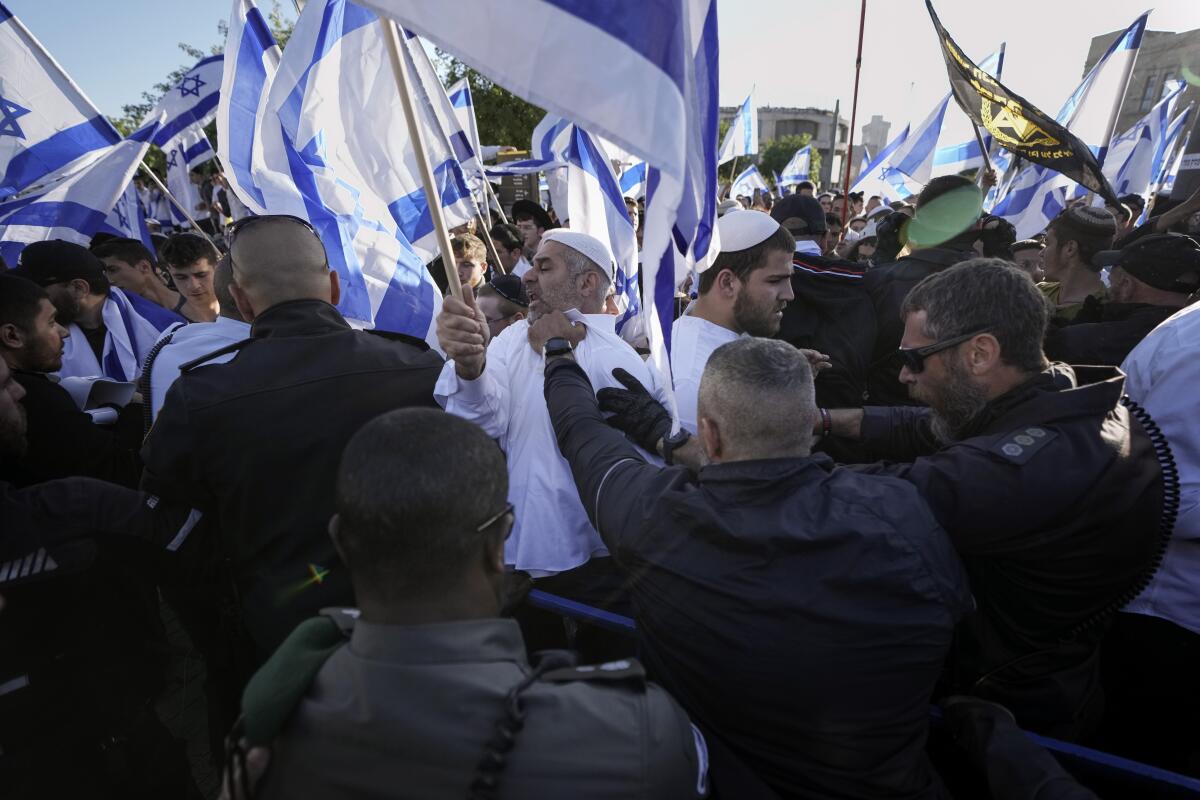Rocket fired at Israel from Gaza as Mideast tensions mount

- Share via
JERUSALEM — A rocket was fired into southern Israel from the Gaza Strip late Wednesday, the Israeli military said, in the second such attack this week as Israeli-Palestinian tensions have soared over violence in Jerusalem.
There were no immediate reports of casualties or damage, and no one claimed responsibility for the strike. Israel holds the Hamas militant group that rules Gaza responsible for all rocket fire and typically responds with airstrikes within hours.
Hamas had earlier issued vague threats over a planned march through Jerusalem by Israeli ultranationalists. But Israeli police blocked roads and prevented the marchers from reaching dense Palestinian neighborhoods in and around the Old City, after a similar event nearly a year ago helped trigger an Israel-Gaza war.
Police used parked trucks and barricades just outside the walls of the Old City to close the main road leading down to Damascus Gate, the epicenter of last year’s unrest. After some pushing and shoving with police, the marchers rallied near the barricades, waving flags, singing and chanting.
Israeli police deployed in large numbers around the historic Old City, home to major religious sites for Jews, Christians and Muslims, out of concern that confrontations could further inflame an already tense situation during the Jewish holiday of Passover and the Muslim holy month of Ramadan.
Tensions have surged in recent weeks after a series of deadly attacks inside Israel, followed by military operations in the occupied West Bank. On Monday, Palestinian militants fired a rocket from the Gaza Strip into Israel for the first time in months, and Israel responded with airstrikes. That rocket was intercepted and there were no casualties from the exchange.
It came after repeated clashes between Israeli police and Palestinians at the Al Aqsa Mosque compound, known to Jews as the Temple Mount.
The hilltop shrine in Jerusalem’s Old City is the third-holiest in Islam, while for Jews it is their holiest site, where two temples stood in antiquity. It is the emotional ground zero for the Israeli-Palestinian conflict and a flashpoint for previous rounds of violence.
Earlier Wednesday, a small group of Palestinian protesters threw rocks at police while hundreds of Jewish visitors entered the holy site.
Amateur video from the scene appeared to show police using sponge-tipped plastic projectiles intended to be nonlethal as the protesters barricaded themselves inside the mosque. Police said a firebomb thrown by one of the protesters set a carpet outside the mosque on fire, but it was quickly extinguished. No injuries were reported.
Hamas said Wednesday ahead of the march that Israel would bear “full responsibility for the repercussions” if it allowed the marchers “to approach our holy sites,” without elaborating.
Itamar Ben Gvir, an ultranationalist lawmaker who frequently stages provocative visits to Palestinian areas, attended the rally and was greeted with cheers. He is a disciple of a radical rabbi whose violently anti-Arab ideology was once shunned in Israel but is now having a revival.
Israeli Prime Minister Naftali Bennett said in a statement that he would bar Ben Gvir from going to Damascus Gate. “I don’t intend to allow petty politics to endanger human lives,” he said.
Last May, Palestinian militants in Gaza fired rockets toward Jerusalem as a much larger group of thousands of Israelis held a flag march to the Old City following weeks of protests and clashes in and around Al Aqsa. Those events led to an 11-day war between Israel and Hamas.
Israeli nationalists stage such marches to try to assert sovereignty over East Jerusalem, which Israel seized in the 1967 Middle East War, along with the West Bank and Gaza, and annexed in a move not recognized internationally. The Palestinians seek an independent state in all three territories and consider East Jerusalem their capital.
Organizer Noam Nisan defended the march in an interview with Kan public radio before it was held, saying: “A Jew with a flag in Jerusalem is not a provocation.”
He said the demonstration was a response to Palestinians pelting buses with stones just outside the Old City this week. The attack happened near an entrance leading to the Western Wall, the holiest site where Jews can pray, which is next to Al Aqsa.
Associated Press writer Joseph Krauss in Jerusalem contributed to this report.
More to Read
Sign up for Essential California
The most important California stories and recommendations in your inbox every morning.
You may occasionally receive promotional content from the Los Angeles Times.










